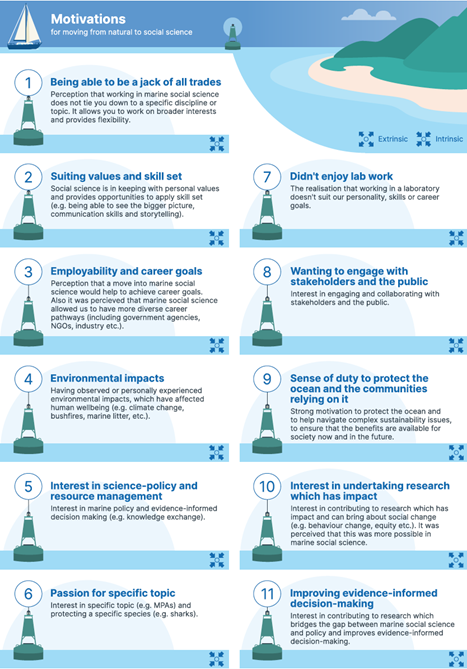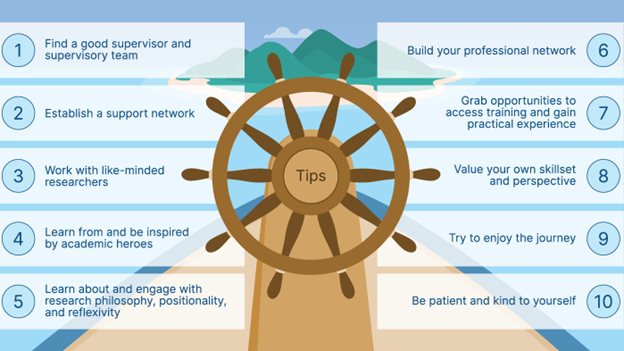By Paris Tuohy, James DelBene, and Rebecca Shellock
Career changes can flip your world upside down, presenting new opportunities and obstacles for anyone. As early career researchers (ECRs) in the marine social sciences, we have navigated these changes across different continents and learned many lessons along the way. The marine social sciences has notably grown in both diversity and numbers in response to increasing calls to better document and understand the human dimensions of the marine and coastal environment. Many in this community, maybe even yourself, have responded to these calls and moved from the natural sciences to pursue a career in the social sciences. Whether you moved to social science with intention or by mere coincidence; as an undergraduate student or a senior researcher; for a single project or your entire career – at some point or another you have made your home in the marine social sciences.
Many ECRs are arriving here much earlier in their academic careers than predecessors, and thus developing stronger interdisciplinary skills than previous generations of social scientists. While training and guidance for the social sciences is becoming more common, there are still a range of challenges that individuals face when moving from being a ‘pure’ natural scientist to an interdisciplinary social scientist. Together, as a team of nine ECRs who have moved to the social sciences within the last 10 years, we share our experiences on what motivated us to make this move and what challenges we faced in doing so. In this perspective (published in ICES Journal of Marine Science), we draw upon our experiences to share our top tips for ECRs faced with similar opportunities and challenges. To supervisors, mentors, and peers of ECRs: we encourage you to also keep reading and take lessons from our experiences in order to better support ECRs who have moved, or are intending to move, between disciplines. We hope that by identifying challenges and barriers and reflecting on our motivations and 10 Tips, you can chart your own course and sail through the rough waters of a career change.
Before going further, we want to acknowledge that our perspective piece is exploratory in nature and is not comprehensive. While our experiences in natural science span global geographic range, our perspective on applying marine social science originates mainly from experiences in Australia, Europe, North America, and the Pacific. Multiple social identities (e.g. race, gender, sexual orientation, socio-economic status, and disability) intersect at the micro-level of individual experience to reflect interlocking systems of privilege and oppression. Hence, future research is required to build on this perspective, to better understand the motivations, barriers, and enablers of ECRs across multiple identities, countries, regions, and cultures.
Motivations
Thus far, research has shown that many marine social scientists originate from natural science, but there is a lack of understanding as to why. As a group, we each individually outlined, then collectively reflected on, the main motivations which led to our move from natural to social science (Figure 1). These motivations were categorised as intrinsic (i.e., associated with actions, which are expected to bring personal pleasure or satisfaction) or extrinsic (i.e., associated with the expected achievement of separable outcomes that are external to the self).

Figure 1: Our main motivations for moving from natural to social science.
Challenges and barriers
Career changes produce challenges and barriers that cause us to reflect on our motivations and rely on our support networks (see 10 Tips). Along the journey from the natural to social sciences, we identified challenges and barriers that can be described as practical and process, institutional, and individual. Practical and process barriers included overcoming differences in research philosophies and data collection techniques between natural and social science, as well as publishing and funding. Additionally, we were often faced with a lack of awareness and understanding of marine social science and its role in the wider system of research and practice. Institutional barriers existed such as a lack of formal training to learn how to conduct social science research and insufficient institutional support in the form of administrative flexibility and help for “doing social science.” Individual barriers stemmed from both practical and process and institutional barriers, which developed into difficulties with gaining foundational knowledge, forming an academic identity, and maintaining self-confidence. These challenges may also exacerbate and/or supplement the barriers that are already experienced by ECRs (e.g., employment uncertainty, demanding workloads, and stress and burnout) and those from minoritized groups. Challenges can interact and accumulate with additional attributes including gender, race, nationality, sexual identity, disability, culture, and caring responsibilities. Hence, it is important to be cognisant of the wide ranging day-to-day challenges that your staff, peers, mentees, and colleagues may be facing on their journey.
Ten Tips
Drawing on our perspectives and experiences, we also highlighted 10 tips for ECRs who are thinking of, or currently making, the move from natural to social science. These strategies can be adopted by ECRs to support and improve their journey. They included: “Find a good supervisor and supervisory team,” “Establish a support network,” “Work with like-minded researchers,” “Learn from and be inspired by academic heroes,” “Learn about and engage with research philosophy, positionality, and reflexivity,” “Build your professional network,” “Grab opportunities to access training and gain practical experience,” “Value your own skillset and perspective,” “Try to enjoy the journey,” and “Be patient and kind to yourself.” The tips are presented in Figure 2. We wish to note that some of the tips may be more relevant at the early stages of the move and others may be more useful further along the journey (i.e., during later stages).

Figure 2: 10 tips for ECRs who are making, or wishing to make, the move from natural to social science.
Concluding remarks
In this perspective, we drew on our own experiences and highlighted the main motivations for our move from natural to social science, the obstacles we have overcome, and our top tips for ECRs making this journey. In presenting these insights, we hope to normalize the challenges that ECRs face and hope to support and empower current and future generations of ECRs faced with similar opportunities and challenges.
You can read the full paper here
Author information
James (Jim) DelBene is a PhD student at the Australian National University in Canberra, Australia. His research is focused on socio-cultural values and their integration in coastal and marine decision-making.
Paris Tuohy is a PhD student at the Australian National University in Canberra. Her research focuses on knowledge co-production processes, specifically understanding how to facilitate equitable and effective knowledge co-production for marine governance.
Rebecca Shellock PhD is a Research Fellow and Marine Social Scientist at the Australian National University. Rebecca has a keen interest in Diversity, Equity and Inclusion and how efforts can improve the quality of research and contribute to more effective and equitable marine governance. Her research encompasses a wide range of topics including: (i) gender representation in marine science, (ii) Ocean Literacy, (iii) knowledge exchange, (iv) socio-cultural values and (v) Marine Protected Areas
